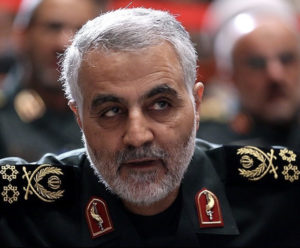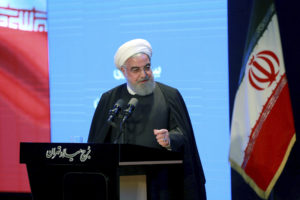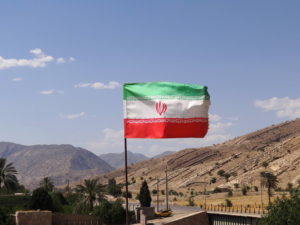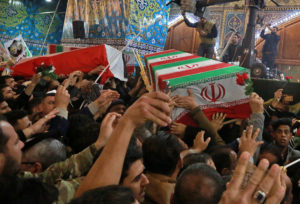Mr. Bush, Tear Down These Walls!
With his security barrier in Baghdad, a wall along the Mexican border and the provocative missile defense shield plan in Europe, President Bush's interest in barrier-building is a betrayal of his conservative forebears that does not bode well for the spread of freedom and democracy.
“Mr. Gorbachev, tear down this wall!” With those six words, President Ronald Reagan cemented his place in history. Uttered on June 12, 1987, with America’s “Great Communicator” standing at the base of the Brandenburg Gate, Reagan’s speech is seen by many as signifying the beginning of the end of the Soviet Union’s hold over Eastern Europe. Nearly two and a half years later, in November 1989, the Berlin Wall came crashing down, and with it decades of Soviet domination over East Germany and the other nations that made up the Warsaw Pact.
Reagan’s speech was full of the flowery rhetoric typical of polarizing political addresses. But it was also rooted in the principles and ideals at the very foundation of America. Reagan wasn’t simply on a political stump, gushing throw-away political promises. He was placing an ideological marker on the ground, establishing a rallying point around which people from all walks of life could assemble in the defense of freedoms not enjoyed on the other side of the Berlin Wall. He pointedly noted, in comparing the forces of democracy and those of communism, “… there stands before the entire world one great and inescapable conclusion: Freedom leads to prosperity. Freedom replaces the ancient hatreds among the nations with comity and peace. Freedom is the victor.”
For Ronald Reagan, the Berlin Wall represented the physical manifestation of the denial of freedom. As such, the infamous barrier was in fact an impediment to prosperity, reinforcing ancient hatreds among nations. Democracy didn’t automatically emerge victorious with the collapse of the Berlin Wall, however. In order for freedom to claim victory from the shadow of the Cold War, prosperity would need to take hold, and peace would need to reign. And indeed, in much of Europe since 1990 this is in fact the situation. Regardless of what one may think about him as a person or president, on this matter Reagan was right: Walls are a barrier to freedom, and as such represent the antithesis of American values.
It is strangely curious that many ideologues on the right wing of the American political spectrum so openly identify with Reagan. As President Bush’s popularity ratings continue to plummet, many old-time Republicans and political conservatives wax philosophical about the “good old days” when a real conservative held the highest office of the land. Yet these are the same people who, when asked to comment point by point about various aspects of the policies of the administration of President George W. Bush, will defend the establishment of barriers dividing the Iraqi city of Baghdad (as well as the parallel policy of fencing off entire Iraqi villages and neighborhoods), the construction of a wall on the border between the United States and Mexico, and the establishment of a missile defense “shield” (nothing less than a wall projected into outer space) over Europe. Reagan, a Republican president, rightly noted that those who defend freedom must oppose walls. The present-day Republicans seem to have forgotten this.
The ongoing policy of building walls in Baghdad designed to segregate Sunni neighborhoods from Shiite neighborhoods is as morally despicable as it is ineffective. The Soviets built walls; the Nazis walled off entire communities, often as a precursor to rounding up the segregated population and shipping it off to concentration camps. History has rightly condemned both practices. The only modern nation that actively incorporates the construction of walls as an aspect of domestic and foreign policy is Israel, and its policy of apartheid regarding the Palestinians is morally indefensible. That the party of Ronald Reagan would willingly ally itself with those who embrace policies so rightly and strongly condemned by America’s 40th president speaks volumes to the moral vacuum it is operating in today. What is the next step these erstwhile “Reaganites” propose to undertake in Baghdad when the construction of walls fails to impede those who fight for the liberation of their nation from the tyranny of a brutal occupier? Concentration camps?
I was recently in the southern Texas city of McAllen, where I was asked by a Hispanic-American what my opinion of the proposed wall along the Mexican-U.S. border was. I told her that I was from New York and as such lacked the intimacy of comprehension about the reality of the immigration situation that someone who lived right on the border might have. However, I said, as a New Yorker I knew a few things about immigration. I’ve had the pleasure of doing a few tours with a fire department in a city in upstate New York, working in the heart of Main Street, USA. There one cannot help but notice that the overwhelming percentage of people living and working in the neighborhood in question is Mexican in origin and, upon a more detailed examination, is from the troubled Mexican city of Oaxaca. While they lived in Oaxaca, these people were racked by crime, poverty and civil strife. In their new home in New York state, they operated as law-abiding residents, paying their taxes and contributing to society. I don’t know if their status in America was consistent with U.S. immigration law. I do know that their presence is a necessary one if this city is to complete the economic rebirth it is striving for. Just ask the firefighters.
I have also taken the time to read the inscription at the Statue of Liberty, one of New York’s — and America’s — greatest monuments to the cause of liberty and freedom. It would do well to repeat it here: “Give me your tired, your poor, your huddled masses yearning to breathe free, the wretched refuse of your teeming shore. Send these, the homeless, tempest-tossed to me. I lift my lamp beside the golden door.” This statement is the very essence of what it means to be an American. I look at the wall this administration is building along the border with Mexico, and I feel nothing but shame toward a nation — my nation — that can so easily turn its back on the very people for whom Lady Liberty served as a beacon on their quest for freedom and liberty.
Recently the head of the U.S. Missile Defense Agency, Gen. Henry Obering, made a visit to the Czech Republic, where he lobbied hard for Czech political approval of the basing of a U.S. antimissile radar system on Czech soil. “We believe that this radar in the Czech Republic will protect European allies and our deployed forces in the region against what we see as a growing Iranian missile threat,” Obering told Czech politicians. This was a curious statement, seeing that the only two missile systems currently deployed in the Middle East that could possibly threaten Europe are the Shavit missile, an Israeli system with a range of over 4,000 kilometers, and the Chinese-made CSS-2 intermediate-range missiles currently in the inventory of Saudi Arabia, possessing a range of between 3,000 and 4,000 kilometers. Iran’s Shahab-3 missile, still in the developmental stage, has a range of between 1,300 and 1,650 kilometers. The distance between the northern Iranian city of Tabriz and Prague is 2,850 kilometers. “We did an analysis of the trajectories from Iran into Europe and from Iran into the U.S. and it turned out that Poland and the Czech Republic are the two nations ideal for the interceptors and long-range radar, respectively,” Gen. Obering said.
Poland, even farther from Iran than the Czech Republic, is another Eastern European nation being courted by the United States as a base for its ostensible “anti-Iranian” ballistic missile shield. There is no threat to Europe from Iran’s missiles. There is, however, a threat to American Middle East policy if Europe and Iran are able to find common diplomatic ground. America’s missile defense shield appears better designed to sink European-Iranian rapprochement than it is to shoot down any Iranian missile.
While there is no doubt that Iran’s missiles do not, and cannot, threaten either Europe or the United States (Obering’s precise calculations notwithstanding), there is in fact no doubt that the proposed missile defense system upsets the delicate strategic balance between the United States and NATO on the one hand and Russia on the other. One of the spinoffs of the rapprochement between Ronald Reagan and Soviet President Michael Gorbachev was the implementation of the Intermediate Nuclear Forces (INF) Treaty, which did away with two entire classes of ballistic missiles (intermediate and short-range) that collectively threatened all of Europe with nuclear holocaust. Much of present-day Europe’s economic prosperity stems from the free flow of ideas and commerce between its newly expanded borders and post-Soviet Russia. The construction of the U.S. missile defense shield in Europe would in fact place the Russians at a strategic disadvantage, something the American designers of the missile shield know full well.
The expansion of NATO in the aftermath of the Cold War has been a very sensitive subject for Moscow, which has watched as the Warsaw Pact collapsed and the borders of the NATO alliance have expanded adjacent to the soil of Mother Russia. The United States, which has been at the head of this aggressive expansion, has repeatedly told the Russians that they have nothing to fear from NATO. The reality is quite different. The expansion of NATO right up to Russia’s borders creates not only the perception but also the reality that the U.S. and Europe are hemming Russia in. Russia is not feeling the pressure from “Old Europe,” the traditional core of NATO, but rather “New Europe,” the former nations of the Warsaw Pact, which still chafe in memory of the Soviet yoke.
The United States has perfected the art of “divide and conquer” politics, using the expansion of NATO as wedge politics within Europe, isolating and weakening Europe’s traditional centers of political and economic strength (France and Germany in particular). The Bush administration’s effort to install a missile defense shield represents a “wall” of sorts being constructed between Europe and Russia, one that will inevitably compel the Russians to withdraw from the INF Treaty and build a new generation of nuclear-tipped missiles that will be targeted at European cities. But it also represents a deliberate effort to build ideological “walls” across Europe, weakening that continent’s ability to stand up to the United States as a singular political and economic entity. America once fought a revolution to free itself from ideological and physical tyranny imposed by an imperialistic power from across the ocean. It is high time that the citizens of Europe recognize that the United States, through its various policies, including NATO expansion and the so-called missile defense shield, is guilty of the same charges we Americans once leveled at the British.
Walls, ideological or physical, on the ground or in space, do not, as Reagan noted, facilitate the cause of liberty and freedom. They restrict it. By walling in the Iraqi citizens of Baghdad, by walling out the immigrants who seek solace within our borders and by partitioning off Europe from Iran and Russia, the Bush administration has become that which America once renounced. All freedom-loving Americans who embrace the cause of liberty and justice for all must rally around the ideals put forward by Reagan when standing next to the Berlin Wall, and declare to the usurper currently sitting in the White House: We welcome change and openness; for we believe that freedom and security go together, that the advance of human liberty can only strengthen the cause of world peace. There is one sign the Bush administration can make that would be unmistakable, that would advance dramatically the cause of freedom and peace. Mr. Bush, if you seek peace, if you seek prosperity for the United States and the world, if you seek liberalization, then tear down these walls!
Your support matters…Independent journalism is under threat and overshadowed by heavily funded mainstream media.
You can help level the playing field. Become a member.
Your tax-deductible contribution keeps us digging beneath the headlines to give you thought-provoking, investigative reporting and analysis that unearths what's really happening- without compromise.
Give today to support our courageous, independent journalists.






You need to be a supporter to comment.
There are currently no responses to this article.
Be the first to respond.